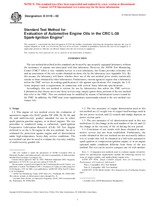Potřebujeme váš souhlas k využití jednotlivých dat, aby se vám mimo jiné mohly ukazovat informace týkající se vašich zájmů. Souhlas udělíte kliknutím na tlačítko „OK“.
ASTM D5119-02
Standard Test Method for Evaluation of Automotive Engine Oils in the CRC L-38 Spark-Ignition Engine (Withdrawn 2003)
Automaticky přeložený název:
Standardní zkušební metoda pro vyhodnocení Automobilové oleje motoru v CRC L - 38 zážehového motoru (Withdrawn 2003 )
NORMA vydána dne 10.6.2002
Informace o normě:
Označení normy: ASTM D5119-02
Poznámka: NEPLATNÁ
Datum vydání normy: 10.6.2002
Kód zboží: NS-29909
Počet stran: 56
Přibližná hmotnost: 168 g (0.37 liber)
Země: Americká technická norma
Kategorie: Technické normy ASTM
Anotace textu normy ASTM D5119-02 :
Keywords:
bearing corrosion, bearing weight loss, CLR oil test engine, copper-lead bearings, deposits, engine oil, L-38 test, oil consumption, oxidation resistance, shear stability, sludge, varnish, viscosity loss, ICS Number Code 75.100 (Lubricants, industrial oils and related products)
Doplňující informace
| 1. Scope | |||||||||||||||||||||||||||||||||||||||||||||||||||||||||||||||||||||||||||||||||||||||||||||||||||||||||||||||||||
|
1.1 This engine oil test method covers the evaluation of automotive engine oils (SAE grades 5W 10W, 20, 30, 40, and 50, and multiviscosity grades) intended for use in either spark-ignition gasoline engines, or in diesel engines. The test procedure is conducted using a carbureted, spark-ignition Cooperative Lubrication Research (CLR) Oil Test Engine (referred to as the L-38 engine in this test method). An oil is evaluated for protection against engine and oil deterioration under high-temperature, heavy-duty service conditions. The test method can also be used to evaluate the viscosity stability of multiviscosity-graded oils. 1.2 The two measures of engine deterioration used in this test method are (1) weight loss of copper-lead bearings used in the test power section, and (2) varnish and sludge deposits on power section parts. 1.3 The two measures of oil deterioration used in this test method are (1) the change in the acid number of the oil, and (2) the change in the viscosity of the oil during the test period. 1.4 Correlation of test results with those obtained in automotive service has not been established. Furthermore, the results obtained in this test method are not necessarily indicative of results that will be obtained in a full-scale automotive spark-ignition or compression-ignition engine, or in an engine operated under conditions different from those of the test method. The test can be used to compare one oil with another. Note 1—Companion test methods used to
evaluate engine oil performance for specification requirements
include the following current versions of single-cylinder and
multicylinder engine tests: 1.5 The values stated in inch-pound units are to be regarded as the standard; except for the case of bearing weight measurements, for which the unit is milligram; and except for viscosity measurements, for which the temperatures of measurement are expressed in C (degrees Celsius). SI values are given in parentheses. In cases where materials, products, or equipment are available only in inch-pound units, SI units are omitted. 1.6 This standard does not purport to address all of the safety concerns, if any, associated with its use. It is the responsibility of the user of this standard to establish appropriate safety and health practices and determine the applicability of regulatory limitations prior to use. 1.7 This test method is arranged as follows:
|
|||||||||||||||||||||||||||||||||||||||||||||||||||||||||||||||||||||||||||||||||||||||||||||||||||||||||||||||||||
Doporučujeme:
Aktualizace zákonů
Chcete mít jistotu o platnosti užívaných předpisů?
Nabízíme Vám řešení, abyste mohli používat stále platné (aktuální) legislativní předpisy.
Chcete vědět více informací? Podívejte se na tuto stránku.




 Cookies
Cookies
